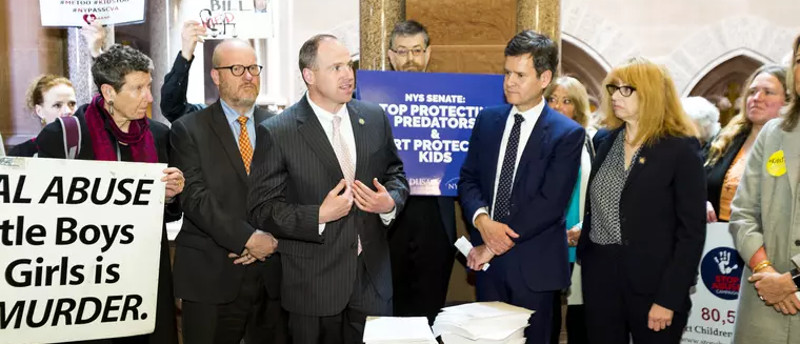New York Extends Statute of Limitations for Child Sexual Abuse Victims

Yesterday, New York Governor Andrew Cuomo signed the Child Victims Act, a bill that revises the statute of limitations for victims who were sexually assaulted as children. The new law increases the age for victims to seek justice against their abusers and other liable parties to:
- The age of 55 for civil lawsuits related to childhood sexual abuse
- The age of 28 for pressing criminal charges
Previously, victims of childhood sexual abuse only had until the age of 23 to seek justice. The bill also opens a one-year "look back" window for victims who had previously been unable to file a lawsuit to file one now.
Catholic Church Sexual Abuse Lawsuits Catholic Dioceses Across the Country Face Thousands of Sex Abuse ClaimsOpposition to Sexual Abuse Statute Reform Overcome
Before passage of the Child Victims Act, New York had one of the most restrictive statutes of limitations when it came to sexual abuse of child victims. Lobbying efforts by victims, advocates and others yielded few results, despite a growing outcry and increasing reports of abuse.
The biggest barrier to reform was the Republican-controlled New York Senate. For years, GOP lawmakers blocked attempts to change the statute of limitations, even though various versions of the bill had been passed by the Democrat-controlled State Assembly. However, with the most recent midterm elections in November, Democrats gained control of both houses of the New York legislature. The Child Victims Act was one of the first bills the newly constituted legislature introduced.
Another stiff opponent of sexual abuse statute reform was the Catholic Church. The church has faced increasing scrutiny in New York and other states for its role in hiding the activities of priests and others accused of abusing children under their care. In the last couple years, lists of priests accused of sexual abuse have been released in a number of New York cities, including Albany, Brooklyn, Buffalo, Rochester, and Syracuse, leading to an increase in public outcry. The Catholic Church objected in particular to the look-back provision, and it pushed hard to have public schools treated the same as its own parochial schools.
What the New Law Means for Child Victims of Sexual Abuse
The biggest change is that child victims of sexual abuse now have significantly longer to pursue civil or criminal actions - and potentially both - against their attackers. The extended statute of limitations also applies to individuals and organizations who may have helped perpetrators of sexual abuse get away with their crimes by hiding evidence and failing to implement institutional safeguards that could have prevented abuse.
A later statute of limitations is important for many victims because of the physical, mental and emotional toll that sexual abuse can have on someone. It can take years, even decades, for some victims to acknowledge what happened to them, let alone work up the courage to name their abusers. Increasing the statute of limitations gives victims more time to work through the trauma of what happened to them without jeopardizing their legal rights to seek justice and compensation for their pain and suffering, medical treatments and other related damages.
In addition, extending the statute of limitations makes it harder for abusers to hide from prosecution due to technicalities of the law. It also increases the liability of organizations like the Catholic Church, making it riskier for them to harbor abusers or hide misconduct.
One Year to File Lawsuits for Past Abuses
Another provision of Child Victims Act gives victims who were unable to file claims under the previous law a chance to file now. This one-year "look back" clause is a sort of catch-all to make sure that older victims who were abused as children, but did not seek justice before the statute of limitations ran out, can receive the same legal rights as everyone else.
ConsumerSafety.org partners with lawyers across the country who specialize in sexual abuse cases related to boarding schools, private schools and religious schools. If you were abused at a school in New York or any other state, get a free case review today to find out more about your legal rights.
